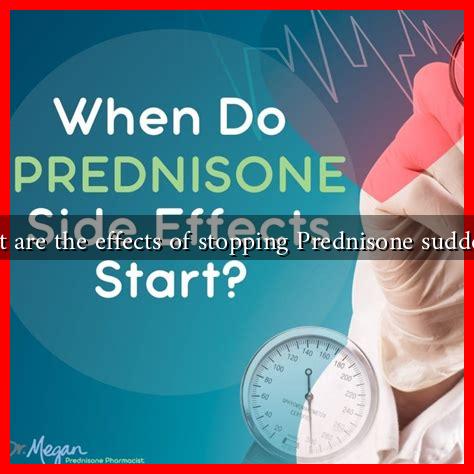-
Table of Contents
What are the Effects of Stopping Prednisone Suddenly?
Prednisone is a synthetic corticosteroid commonly prescribed to treat a variety of conditions, including autoimmune diseases, allergies, and inflammatory disorders. While it can be highly effective in managing symptoms, discontinuing prednisone abruptly can lead to significant health risks. This article explores the effects of stopping prednisone suddenly, the reasons behind these effects, and the importance of tapering off the medication safely.
Understanding Prednisone and Its Role in the Body
Prednisone mimics the effects of cortisol, a hormone produced by the adrenal glands. It helps reduce inflammation and suppress the immune system. When taken for an extended period, the body may become reliant on the medication, leading to a suppression of natural cortisol production. This dependency is a key reason why stopping prednisone suddenly can have serious consequences.
Effects of Abruptly Stopping Prednisone
When a patient stops taking prednisone suddenly, they may experience a range of withdrawal symptoms and complications. These can include:
- Adrenal Insufficiency: The most serious consequence of stopping prednisone suddenly is adrenal insufficiency. The adrenal glands may not produce enough cortisol, leading to symptoms such as fatigue, weakness, and low blood pressure.
- Flare-Up of Underlying Conditions: Patients may experience a resurgence of the symptoms that prednisone was initially prescribed to manage, such as inflammation and pain.
- Psychological Effects: Withdrawal can lead to mood swings, anxiety, and depression, as the body struggles to adjust to the absence of the medication.
- Physical Symptoms: Common physical withdrawal symptoms include nausea, vomiting, loss of appetite, and muscle pain.
Case Studies and Statistics
Research indicates that abrupt withdrawal from corticosteroids like prednisone can lead to severe complications. A study published in the Journal of Clinical Endocrinology & Metabolism found that patients who stopped taking corticosteroids suddenly experienced adrenal crisis in 5-10% of cases. This condition can be life-threatening and requires immediate medical attention.
In a case study involving a patient with rheumatoid arthritis, the individual stopped taking prednisone without medical guidance. Within days, they experienced severe joint pain and fatigue, necessitating a return to the medication and a gradual tapering process. This highlights the importance of following a healthcare provider’s advice when discontinuing prednisone.
The Importance of Tapering Off Prednisone
To avoid the adverse effects associated with sudden withdrawal, it is crucial to taper off prednisone gradually. Tapering allows the body to adjust and resume natural cortisol production. Here are some guidelines for tapering:
- Consult Your Doctor: Always discuss your plan to stop prednisone with your healthcare provider. They can create a personalized tapering schedule based on your specific situation.
- Follow a Gradual Reduction Plan: Typically, the dosage is reduced slowly over weeks or months, depending on the length of time the patient has been on prednisone.
- Monitor Symptoms: Keep track of any withdrawal symptoms or flare-ups of the underlying condition and report them to your doctor.
Conclusion
Stopping prednisone suddenly can lead to a range of serious health issues, including adrenal insufficiency, flare-ups of underlying conditions, and psychological effects. The importance of tapering off the medication cannot be overstated, as it allows the body to adjust and minimizes withdrawal symptoms. Always consult with a healthcare provider before making any changes to your medication regimen. By understanding the risks associated with abrupt cessation and following a proper tapering plan, patients can ensure a safer transition away from prednisone.

